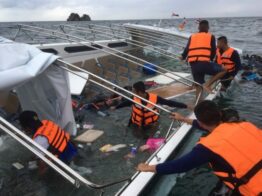
Breaking Barriers: Challenges Facing Thailand’s International Maritime Expansion
Thailand’s maritime industry possesses a wealth of potential, yet it has struggled to make a significant impact on the global stage. Despite its rich boat-building tradition and the allure of its charter industry, Thailand’s maritime products and services have found limited success beyond neighbouring countries. So, what’s holding Thailand back from international maritime prominence?
**A Narrow Export Horizon**
One evident stumbling block is the limited presence of Thai boat builders in international markets. Delving deeper, we discover that only a handful of these builders venture beyond neighboring borders. The question arises: Why is this the case?
**Navigating International Waters**
To answer this question, let’s explore a significant factor—regulations and standards. Thailand, through the Thai Industrial Standard Institute, is an observing member of the International Organization for Standardization Technical Committee 188 (ISO TC 188) for small craft. ISO TC 188 establishes standardized guidelines for the construction and equipment of recreational and small watercraft up to 24 meters in hull length. Remarkably, these standards align with the criteria set by the European Recreational Craft Directive and UKCA requirements, lending them international credibility.
However, this knowledge seems to be confined to a small circle of Thai boat builders exporting to Europe. Consequently, many within the Thai boating industry remain unaware of these standards, leading to a divergence in quality and safety practices. While some are content with this familiar approach, it ultimately results in subpar products and muddled expectations for customers.
**Anchoring the Charter Industry**
Thailand’s charter industry similarly faces its own set of challenges. The ISO Technical Committee 228 (ISO TC 228) is responsible for standardizing tourism and related services. Despite being a participating member, Thailand has yet to adopt many of the relevant standards, particularly concerning diving services, yacht harbours and bareboat services. This lack of uniformity may help explain the relatively subdued appeal of Thai charter experiences compared to those in Caribbean destinations.
**A Call to Navigate Forward**
The reluctance to embrace internationally recognized standards is a concerning roadblock in Thailand’s journey toward global maritime prominence. With a surfeit of accidents at sea, the absence of these standards might offer a partial explanation. Isn’t it time for Thailand to break free from insularity and embrace globally recognized practices?
**Charting a Course for Change**
Thailand’s retreat from international bodies like the International Council of Marine Industry Associations has been perplexing, raising concerns about its commitment to evolving maritime standards. Rather than fostering growth, this retreat isolates Thailand further and limits its engagement with regional and global maritime developments.
**Shifting Tides of Opportunity**
In contemplating the legislative landscape, it becomes evident that Thailand’s struggle to break through internationally is closely tied to its reluctance to adopt comprehensive international standards. This issue demands spotlighting at the upcoming Boating Conference during the Thailand International Boat Show. The presence of both the Thai Industrial Standard Institute and the Thai Maritime Authorities is pivotal to navigating these uncharted waters.
As Thailand sets its sights on international maritime success, it’s imperative that the nation steers toward embracing globally accepted standards. Only then can Thailand’s maritime industry truly chart a course towards international prominence and navigate the waves of opportunity on the global stage.
